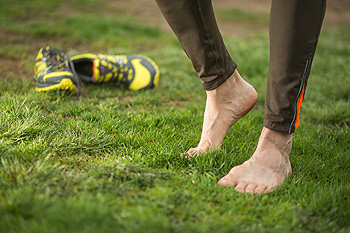 Milind Soman is a marathon runner who was forced to experiment with barefoot running in 2011 when he developed a blister on his foot. In regards to his experience, Soman states “My feet felt refreshed and energized. There were minute changes in my form, balance and posture that made my running movement feel more effortless. I even found that it encouraged me to run from the core.” He mentions that it took him over a year for his muscles to adjust to barefoot running, and that he had to gradually increase his running distance to a half-marathon. Many people are following the barefoot running trend, as they believe it strengthens the feet and is more natural compared to wearing highly-cushioned shoes. However, if you are considering transitioning to barefoot running, it is advised that you start out with shorter distances before working your way up to long distances.
Milind Soman is a marathon runner who was forced to experiment with barefoot running in 2011 when he developed a blister on his foot. In regards to his experience, Soman states “My feet felt refreshed and energized. There were minute changes in my form, balance and posture that made my running movement feel more effortless. I even found that it encouraged me to run from the core.” He mentions that it took him over a year for his muscles to adjust to barefoot running, and that he had to gradually increase his running distance to a half-marathon. Many people are following the barefoot running trend, as they believe it strengthens the feet and is more natural compared to wearing highly-cushioned shoes. However, if you are considering transitioning to barefoot running, it is advised that you start out with shorter distances before working your way up to long distances.
Barefoot running has grown in popularity in recent years and has been found to offer some benefits over running in shoes. If you are interested in running barefoot, consult with one of our podiatrists from Lovely Foot Associates, PC. Our doctors will assess your condition and provide you with quality advice and whether barefoot running is right for you.
What Is Barefoot Running?
While running shoes provide excellent support and protection to our feet, they can negatively impact the way we run. Those who run in shoes have been found to be more likely hit the ground with their heels first. This running style has been found to increase the risk of injury from ankle sprains, stress fractures, and Achilles tendinitis. Those who run barefoot tend to land on the balls of their feet which generates less impact.
Benefits of Running Barefoot
Some reported benefits of running barefoot include:
Downsides to Running Barefoot
Those with diabetes should avoid barefoot running at all costs. This is due to the risk of sustaining a wound that could become infected. If you do decide to run barefoot, inspect the area you are running in for lots of debris. Furthermore, it is best to start off slow and to not push yourself too hard the first time out, even if you run in shoes regularly. Another substitute for running shoes are minimalist shoes which reduce the weight of shoes but provide better protection.
If you have any questions, please feel free to contact our office located in Johnstown, PA . We offer the newest diagnostic and treatment technologies for all your foot care needs.